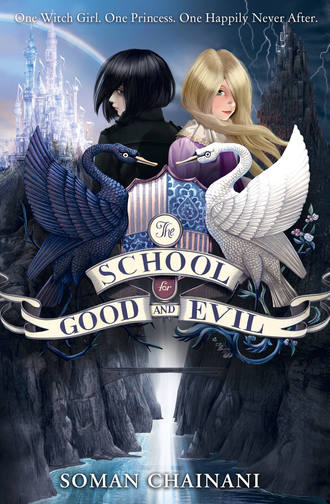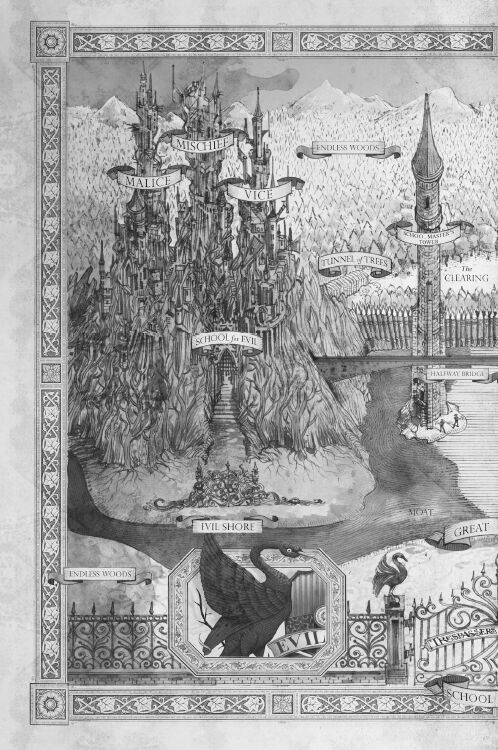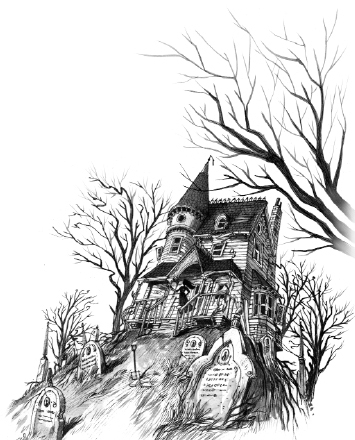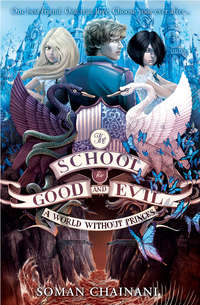
Полная версия
The School for Good and Evil



Copyright
HarperCollins Children’s Books
A division of HarperCollinsPublishers Ltd.
1 London Bridge Street
London SE1 9GF
www.harpercollins.co.uk
Start your education at www.schoolforgoodandevil.com
First published in the USA by HarperCollins Children’s Books, an imprint of HarperCollins Publishers, Inc. in 2013
First published in Great Britain by HarperCollins Children’s Books in 2013
The School for Good and Evil
Text copyright © 2013 by Soman Chainani
Illustrations copyright © 2013 by Iacopo Bruno
The author and illustrator assert the moral right to be identified as the author and illustrator of the work.
A catalogue record for this book is available from the British Library
All rights reserved under International and Pan-American Copyright Conventions. By payment of the required fees, you have been granted the non-exclusive, non-transferable right to access and read the text of this ebook on-screen. No part of this text may be reproduced, transmitted, down-loaded, decompiled, reverse engineered, or stored in or introduced into any information storage and retrieval system, in any form or by any means, whether electronic or mechanical, now known or hereinafter invented, without the express written permission of HarperCollins ebooks
HarperCollinsPublishers has made every reasonable effort to ensure that any picture content or written content in this ebook has been included or removed in accordance with the contractual and technological constraints in operation at the time of publication
Source ISBN: 9780007492930
Ebook Edition © JUNE 2013 ISBN: 9780007492947
Version: 2017-10-27
IN THE FOREST PRIMEVAL
A SCHOOL FOR GOOD AND EVIL
TWO TOWERS LIKE TWIN HEADS
ONE FOR THE PURE
ONE FOR THE WICKED
TRY TO ESCAPE YOU’LL ALWAYS FAIL
THE ONLY WAY OUT IS
THROUGH A FAIRY TALE
Contents
Title Page
Copyright
Dedication
1 - The Princess & The Witch
2 - The Art of Kidnapping
3 - The Great Mistake
4 - The Three Witches of Room 66
5 - Boys Ruin Everything
6 - Definitely Evil
7 - Grand High Witch Ultimate
8 - Wish Fish
9 - The 100% Talent Show
10 - Bad Group
11 - The School Master’s Riddle
12 - Dead Ends
13 - Doom Room
14 - The Crypt Keeper’s Solution
15 - Choose Your Coffin
16 - Cupid Goes Rogue
17 - The Empress’s New Clothes
18 - The Roach and the Fox
19 - I Have a Prince
20 - Secrets and Lies
21 - Trial by Tale
22 - Nemesis Dreams
23 - Magic in the Mirror
24 - Hope in the Toilet
25 - Symptoms
26 - The Circus of Talents
27 - Promises Unkept
28 - The Witch of Woods Beyond
29 - Beautiful Evil
30 - Never After
Keep Reading
About the Author
About the Publisher




But tonight, all the other children of Gavaldon writhed in their beds. If the School Master took them, they’d never return. Never lead a full life. Never see their family again. Tonight these children dreamt of a red-eyed thief with the body of a beast, come to rip them from their sheets and stifle their screams.
Sophie dreamt of princes instead.

She had arrived at a castle ball thrown in her honor, only to find the hall filled with a hundred suitors and no other girls in sight. Here for the first time were boys who deserved her, she thought as she walked the line. Hair shiny and thick, muscles taut through shirts, skin smooth and tan, beautiful and attentive like princes should be. But just as she came to one who seemed better than the rest, with brilliant blue eyes and ghostly white hair, the one who felt like Happily Ever After . . . a hammer broke through the walls of the room and smashed the princes to shards.
Sophie’s eyes opened to morning. The hammer was real. The princes were not.
“Father, if I don’t sleep nine hours, my eyes look swollen.”
“Everyone’s prattling on that you’re to be taken this year,” her father said, nailing a misshapen bar over her bedroom window, now completely obscured by locks, spikes, and screws. “They tell me to shear your hair, muddy up your face, as if I believe all this fairy-tale hogwash. But no one’s getting in here tonight. That’s for sure.” He pounded a deafening crack as exclamation.
Sophie rubbed her ears and frowned at her once lovely window, now something you’d see in a witch’s den. “Locks. Why didn’t anyone think of that before?”
“I don’t know why they all think it’s you,” he said, silver hair slicked with sweat. “If it’s goodness that School Master fellow wants, he’ll take Gunilda’s daughter.”
Sophie tensed. “Belle?”
“Perfect child that one is,” he said. “Brings her father home-cooked lunches at the mill. Gives the leftovers to the poor hag in the square.”
Sophie heard the edge in her father’s voice. She had never once cooked a full meal for him, even after her mother died. Naturally she had good reason (the oil and smoke would clog her pores) but she knew it was a sore point. This didn’t mean her father had gone hungry. Instead, she offered him her own favorite foods: mashed beets, broccoli stew, boiled asparagus, steamed spinach. He hadn’t ballooned into a blimp like Belle’s father, precisely because she hadn’t brought him home-cooked lamb fricassees and cheese soufflés at the mill. As for the poor hag in the square, that old crone, despite claiming hunger day after day, was fat. And if Belle had anything to do with it, then she wasn’t good at all, but the worst kind of evil.
Sophie smiled back at her father. “Like you said, it’s all hogwash.” She swept out of bed and slammed the bathroom door.
She studied her face in the mirror. The rude awakening had taken its toll. Her waist-long hair, the color of spun gold, didn’t have its usual sheen. Her jade-green eyes looked faded, her luscious red lips a touch dry. Even the glow of her creamy peach skin had dulled. But still a princess, she thought. Her father couldn’t see she was special, but her mother had. “You are too beautiful for this world, Sophie,” she said with her last breaths. Her mother had gone somewhere better and now so would she.
Tonight she would be taken into the woods. Tonight she would begin a new life. Tonight she would live out her fairy tale.
And now she needed to look the part.
To begin, she rubbed fish eggs into her skin, which smelled of dirty feet but warded off spots. Then she massaged in pumpkin puree, rinsed with goat’s milk, and soaked her face in a mask of melon and turtle egg yolk. As she waited for the mask to dry, Sophie flipped through a storybook and sipped on cucumber juice to keep her skin dewy soft. She skipped to her favorite part of the story, where the wicked hag is rolled down a hill in a nail-spiked barrel, until all that remains is her bracelet made of little boys’ bones. Gazing at the gruesome bracelet, Sophie felt her thoughts drift to cucumbers. Suppose there were no cucumbers in the woods? Suppose other princesses had depleted the supply? No cucumbers! She’d shrivel, she’d wither, she’d—
Dried melon flakes fell to the page. She turned to the mirror and saw her brow creased in worry. First ruined sleep and now wrinkles. At this rate she’d be a hag by afternoon. She relaxed her face and banished thoughts of vegetables.
As for the rest of Sophie’s beauty routine, it could fill a dozen storybooks (suffice it to say it included goose feathers, pickled potatoes, horse hooves, cream of cashews, and a vial of cow’s blood). Two hours of rigorous grooming later, she stepped from the house in a breezy pink dress, sparkling glass heels, and hair in an impeccable braid. She had one last day before the School Master’s arrival and planned to use each and every minute to remind him why she, and not Belle or Tabitha or Sabrina or any other impostor, should be kidnapped.
Sophie’s best friend lived in a cemetery. Given her loathing of things grim, gray, and poorly lit, one would expect Sophie to host visits at her cottage or find a new best friend. But instead, she had climbed to the house atop Graves Hill every day this week, careful to maintain a smile on her face, since that was the point of a good deed after all.
To get there, she had to walk nearly a mile from the bright lakeside cottages, with green eaves and sun-drenched turrets, towards the gloomy edges of the forest. Sounds of hammering echoed through cottage lanes as she passed fathers boarding up doors, mothers stuffing scarecrows, boys and girls hunched on porches, noses buried in storybooks. The last sight wasn’t unusual, for children in Gavaldon did little besides read their fairy tales. But today Sophie noticed their eyes, wild, frenzied, scouring each page as if their lives depended on it. Four years ago, she had seen the same desperation to avoid the curse, but it wasn’t her turn then. The School Master took only those past their twelfth year, those who could no longer disguise as children.
Now her turn had come.
As she slogged up Graves Hill, picnic basket in hand, Sophie felt her thighs burn. Had these climbs thickened her legs? All the princesses in storybooks had the same perfect proportions; thick thighs were as unlikely as a hooked nose or big feet. Feeling anxious, Sophie distracted herself by counting her good deeds from the day before. First, she had fed the lake’s geese a blend of lentils and leeks (a natural laxative to offset cheese thrown by oafish children). Then she had donated homemade lemonwood face wash to the town orphanage (for, as she insisted to the befuddled benefactor, “Proper skin care is the greatest deed of all.”). Finally she had put up a mirror in the church toilet, so people could return to the pews looking their best. Was this enough? Did these compete with baking homemade pies and feeding homeless hags? Her thoughts shifted nervously to cucumbers. Perhaps she could sneak a private supply into the woods. She still had plenty of time to pack before nightfall. But weren’t cucumbers heavy? Would the school send footmen? Perhaps she should juice them before she—
“Where you going?”
Sophie turned. Radley smiled at her with buckteeth and anemically red hair. He lived nowhere near Graves Hill but made it a habit to stalk her all hours of the day.
“To see a friend,” said Sophie.
“Why are you friends with the witch?” said Radley.
“She’s not a witch.”
“She has no friends and she’s queer. That makes her a witch.”
Sophie refrained from pointing out this made Radley a witch too. Instead she smiled to remind him she’d already done her good deed by enduring his presence.
“The School Master will take her for Evil School,” he said. “Then you’ll need a new friend.”
“He takes two children,” Sophie said, jaw tightening.
“He’ll take Belle for the other one. No one’s as good as Belle.”
Sophie’s smile evaporated.
“But I’ll be your new friend,” said Radley.
“I’m full on friends at the moment,” Sophie snapped.
Radley turned the color of a raspberry. “Oh, right—I just thought—” He fled like a kicked dog.
Sophie watched his straggly hair recede down the hill. Oh, you’ve really done it now, she thought. Months of good deeds and forced smiles and now she’d ruined it for runty Radley. Why not make his day? Why not simply answer, “I’d be honored to have you as my friend!” and give the idiot a moment he’d relive for years? She knew it was the prudent thing to do, since the School Master must be judging her as closely as St. Nicholas the night before Christmas. But she couldn’t do it. She was beautiful, Radley was ugly. Only a villain would delude him. Surely the School Master would understand that.
Sophie pulled open the rusted cemetery gates and felt weeds scratch at her legs. Across the hilltop, moldy headstones forked haphazardly from dunes of dead leaves. Squeezing between dark tombs and decaying branches, Sophie kept careful count of the rows. She had never looked at her mother’s grave, even at the funeral, and she wouldn’t start today. As she passed the sixth row, she glued her eyes to a weeping birch and reminded herself where she’d be a day from now.
In the middle of the thickest batch of tombs stood 1 Graves Hill. The house wasn’t boarded up or bolted shut like the cottages by the lake, but that didn’t make it any more inviting. The steps leading up to the porch glowed mildew green. Dead birches and vines wormed their way around dark wood, and the sharply angled roof, black and thin, loomed like a witch’s hat.
As she climbed the moaning porch steps, Sophie tried to ignore the smell, a mix of garlic and wet cat, and averted her eyes from the headless birds sprinkled around, no doubt the victims of the latter.
She knocked on the door and prepared for a fight.
“Go away,” came the gruff voice.
“That’s no way to speak to your best friend,” Sophie cooed.
“You’re not my best friend.”
“Who is, then?” Sophie asked, wondering if Belle had somehow made her way to Graves Hill.
“None of your business.”
Sophie took a deep breath. She didn’t want another Radley incident. “We had such a good time yesterday, Agatha. I thought we’d do it again.”
“You dyed my hair orange.”
“But we fixed it, didn’t we?”
“You always test your creams and potions on me just to see how they work.”
“Isn’t that what friends are for?” Sophie said. “To help each other?”
“I’ll never be as pretty as you.”
Sophie tried to find something nice to say. She took too long and heard shoes stomp away.
“That doesn’t mean we can’t be friends!” Sophie called.
A familiar cat, bald and wrinkled, growled at her across the porch. She whipped back to the door. “I brought biscuits!”
Shoesteps stopped. “Real ones or ones you made?”
Sophie shrank from the slinking cat. “Fluffy and buttery, just like you love!”
The cat hissed.
“Agatha, let me in—”
“You’ll say I smell.”
“You don’t smell.”
“Then why’d you say it last time?”
“Because you smelled last time! Agatha, the cat’s spitting—”
“Maybe it smells ulterior motives.”
The cat bared claws.
“Agatha, open the door!”
It pounced at her face. Sophie screamed. A hand stabbed between them and swatted the cat down.
Sophie looked up.
“Reaper ran out of birds,” said Agatha.
Her hideous dome of black hair looked like it was coated in oil. Her hulking black dress, shapeless as a potato sack, couldn’t hide freakishly pale skin and jutting bones. Ladybug eyes bulged from her sunken face.
“I thought we’d go for a walk,” Sophie said.
Agatha leaned against the door. “I’m still trying to figure out why you’re friends with me.”
“Because you’re sweet and funny,” said Sophie.
“My mother says I’m bitter and grumpy,” said Agatha. “So one of you is lying.”
She reached into Sophie’s basket and pulled back the napkin to reveal dry, butterless bran biscuits. Agatha gave Sophie a withering stare and retreated into the house.
“So we can’t take a walk?” Sophie asked.
Agatha started to close the door but then saw her crestfallen face. As if Sophie had looked forward to their walk as much as she had.
“A short one.” Agatha trudged past her. “But if you say anything smug or stuck-up or shallow, I’ll have Reaper follow you home.”
Sophie ran after her. “But then I can’t talk!”
After four years, the dreaded eleventh night of the eleventh month had arrived. In the late-day sun, the square had become a hive of preparation for the School Master’s arrival. The men sharpened swords, set traps, and plotted the night’s guard, while the women lined up the children and went to work. Handsome ones had their hair lopped off, teeth blackened, and clothes shredded to rags; homely ones were scrubbed, swathed in bright colors, and fitted with veils. Mothers begged the best-behaved children to curse or kick their sisters, the worst were bribed to pray in the church, while the rest in line were led in choruses of the village anthem: “Blessed Are the Ordinary.”
Fear swelled into a contagious fog. In a dim alley, the butcher and blacksmith traded storybooks for clues to save their sons. Beneath the crooked clock tower, two sisters listed fairy-tale villain names to hunt for patterns. A group of boys chained their bodies together, a few girls hid on the school roof, and a masked child jumped from bushes to spook his mother, earning a spanking on the spot. Even the homeless hag got into the act, hopping before a meager fire, croaking, “Burn the storybooks! Burn them all!” But no one listened and no books were burned.
Agatha gawped at all this in disbelief. “How can a whole town believe in fairy tales?”
“Because they’re real.”
Agatha stopped walking. “You can’t actually believe the legend is true.”
“Of course I do,” said Sophie.
“That a School Master kidnaps two children, takes them to a school where one learns Good, one learns Evil, and they graduate into fairy tales?”
“Sounds about right.”
“Tell me if you see an oven.”
“Why?”
“I want to put my head in it. And what, pray tell, do they teach at this school exactly?”
“Well, in the School for Good, they teach boys and girls like me how to become heroes and princesses, how to rule kingdoms justly, how to find Happily Ever After,” Sophie said. “In the School for Evil, they teach you how to become wicked witches and humpbacked trolls, how to lay curses and cast evil spells.”
“Evil spells?” Agatha cackled. “Who came up with this? A four-year-old?”
“Agatha, the proof’s in the storybooks! You can see the missing children in the drawings! Jack, Rose, Rapunzel—they all got their own tales—”
“I don’t see anything, because I don’t read dumb storybooks.”
“Then why is there a stack by your bed?” Sophie asked.
Agatha scowled. “Look, who’s to say the books are even real? Maybe it’s the bookseller’s prank. Maybe it’s the Elders’ way to keep children out of the woods. Whatever the explanation, it isn’t a School Master and it isn’t evil spells.”
“So who’s kidnapping the children?”
“No one. Every four years, two idiots sneak into the woods, hoping to scare their parents, only to get lost or eaten by wolves, and there you have it, the legend continues.”
“That’s the stupidest explanation I’ve ever heard.”
“I don’t think I’m the stupid one here,” Agatha said.
There was something about being called stupid that set Sophie’s blood aflame.
“You’re just scared,” she said.
“Right,” Agatha laughed. “And why would I be scared?”
“Because you know you’re coming with me.”
Agatha stopped laughing. Then her gaze moved past Sophie into the square. The villagers were staring at them like the solution to a mystery. Good in pink, Evil in black. The School Master’s perfect pair.
Frozen still, Agatha watched dozens of scared eyes bore into her. Her first thought was that after tomorrow she and Sophie could take their walks in peace. Next to her, Sophie watched children memorize her face in case it appeared in their storybooks one day. Her first thought was whether they looked at Belle the same way.
Then, through the crowd, she saw her.
Head shaved, dress filthy, Belle kneeled in dirt, frantically muddying her own face. Sophie drew a breath. For Belle was just like the others. She wanted a mundane marriage to a man who would grow fat, lazy, and demanding. She wanted monotonous days of cooking, cleaning, sewing. She wanted to shovel dung and milk sheep and slaughter squealing pigs. She wanted to rot in Gavaldon until her skin was liver-spotted and her teeth fell out. The School Master would never take Belle because Belle wasn’t a princess. She was . . . nothing.
Victorious, Sophie beamed back at the pathetic villagers and basked in their stares like shiny mirrors—
“Let’s go,” said Agatha.
Sophie turned. Agatha’s eyes were locked on the mob.
“Where?”
“Away from people.”
As the sun weakened to a red orb, two girls, one beautiful, one ugly, sat side by side on the shore of a lake. Sophie packed cucumbers in a silk pouch, while Agatha flicked lit matches into the water. After the tenth match, Sophie threw her a look.
“It relaxes me,” Agatha said.
Sophie tried to make room for the last cucumber. “Why would someone like Belle want to stay here? Who would choose this over a fairy tale?”
“And who would choose to leave their family forever?” Agatha snorted.
“Except me, you mean,” said Sophie.
They fell silent.
“Do you ever wonder where your father went?” Sophie asked.
“I told you. He left after I was born.”
“But where would he go? We’re surrounded by woods! To suddenly disappear like that . . .” Sophie spun. “Maybe he found a way into the stories! Maybe he found a magic portal! Maybe he’s waiting for you on the other side!”
“Or maybe he went back to his wife, pretended I never happened, and died ten years ago in a mill accident.”
Sophie bit her lip and went back to cucumbers.
“Your mother’s never at home when I visit.”
“She goes into town now,” said Agatha. “Not enough patients at the house. Probably the location.”
“I’m sure that’s it,” Sophie said, knowing no one would trust Agatha’s mother to treat diaper rash, let alone illness. “I don’t think a graveyard makes people all that comfortable.”
“Graveyards have their benefits,” Agatha said. “No nosy neighbors. No drop-in salesmen. No fishy ‘friends’ bearing face masks and diet cookies, telling you you’re going to Evil School in Magic Fairy Land.” She flicked a match with relish.
Sophie put down her cucumber. “So I’m fishy now.”
“Who asked you to show up? I was perfectly fine alone.”
“You always let me in.”
“Because you always seem so lonely,” said Agatha. “And I feel sorry for you.”
“Sorry for me?” Sophie’s eyes flashed. “You’re lucky that someone would come see you when no one else will. You’re lucky that someone like me would be your friend. You’re lucky that someone like me is such a good person.”







